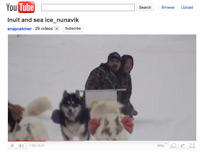Roberta Bondar Fellow Dr. Scott Heyes greeted visitors at the entrance to Bagnani Hall at Traill College on October 20, 2010 for the second lecture of both his fellowship and the North at Trent Lecture series designed to highlight Trent’s longstanding and continuing interest in the North.
Having recently completed a season of fieldwork with Inuit elders in a community near Ungava Bay, northern Quebec, Professor Heyes shared his developing work of a dictionary of sea-ice terms as part of a larger knowledge preservation project. His work examines the changes in Inuit terminology from one generation to the next, specifically in relation to the shrinking sea ice along the coastal landscape.
 The video shown by Prof. Heyes during his lecture can be viewed on youtube at: http://www.youtube.com/watch?v=WIDvaMHxyhA
The video shown by Prof. Heyes during his lecture can be viewed on youtube at: http://www.youtube.com/watch?v=WIDvaMHxyhA
“We hear about the deteriorating ice in the media according to climate change, but rarely the social implications of that,” said Prof. Heyes, who pointed out the many activities that comprise the Inuit way of life along the coast, including seal hunting, fishing, camping and dog-sledding.
Prof. Heyes described in detail how the sea ice holds a sense of place for the Inuit as a highway and a hunting ground, and a sense of time in its tides, seasons and migratory patterns. He called it a classroom for the sharing of knowledge with elders that offers legends and spiritual connotations. The question remains: is the disappearance of the sea ice threatening the dispersal of Inuit knowledge, knowledge that is critical for the physical and cultural survival of a community?
To address this, Prof. Heyes has been conducting interviews and communicating through the use of drawings and an interpreter to determine the loss and change of words from generation to generation. He has been working with thirty-four people from six families for several years and has noted that different generations are using changing vocabularies associated with seal hunting, fresh water and danger, all terms necessary for survival.
“The demise of sea-ice knowledge will amount to a loss of landscape and seascape literacy,” argued Prof. Heyes, who has developed a chart of terms that tracks vocabulary shifts from one generation to the next. This chart is currently being used in the Inuit classrooms as a basis for discussion. Prof. Heyes would like to see further work with schools in the future to ensure that the Inuit cultural knowledge is taught and preserved.
When asked about his experience at Trent since arriving in February, Prof. Heyes said, "I have thoroughly enjoyed researching and teaching at Trent since arriving in Peterborough in February. Trent has so much to offer early career scholars with Northern interests. The advice of many polar experts has been critical to guiding my research and to expanding my knowledge of the North. “
Prof. Heyes holds a Ph.D. in geography from McGill University. Prior to his arrival at Trent, he held a position at the University of Melbourne’s Faculty of Architecture, Building and Planning. In 2010 Scott was awarded a three-month Visiting Fellowship at the Smithsonian Institution’s Arctic Studies Center. Upon the completion of his time at Trent in February 2011, Prof. Heyes will take up his new position as an assistant professor in landscape architecture in the Faculty of Arts and Design at the University of Canberra.
The Roberta Bondar Fellowship in Northern and Polar Studies is a postdoctoral teaching and research award. The fellowship is intended to attract up-and-coming northern scholars to Trent for the period of one academic year. The fellowship named in honour of Dr. Roberta Bondar, renowned space scientist, neurologist, astronaut and former Trent University chancellor, is intended to foster interest in Northern Studies at Trent, and is based in the Frost Centre for Canadian Studies and Indigenous Studies.
Posted on Friday, October 22, 2010.


































